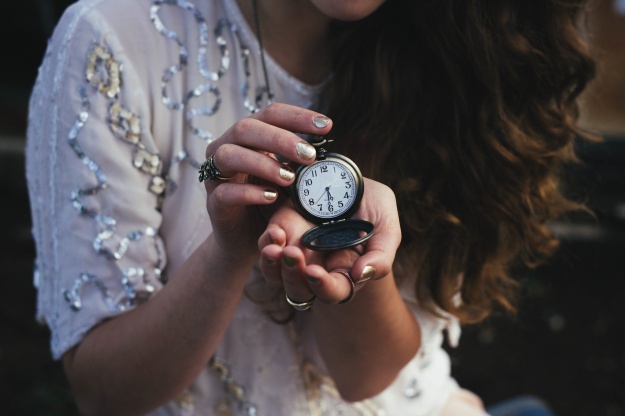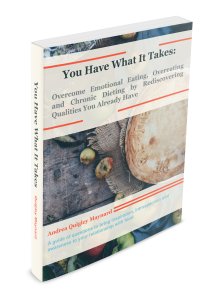
We make deliberate choices every day, often every hour about what and how we will eat. There is freedom in this.
I just want to point out that getting better from our struggles with food doesn’t happen by chance.
I talk to a lot of women who seem to believe that there must be a secret way out of all of this – one that will allow them to be somewhat unconscious or inactive while someone or something else does the work (I’ve been there!).
We won’t wake up one day able to eat the exact right amount for our body without judgement, without overeating and without a lot of conscious choices just because we’ve been hoping that would happen.
I certainly tried that. I remember literally trying to “pray” away my weight as a kid. And as I got older, I definitely daydreamed about just waking up in a body that wasn’t confused about food.
We won’t “fix” our stuff just because someone gave us the right diet plan. Being told what to eat and how much is liberating, but only briefly. I say briefly, because on any diet, we will find ourselves choosing to not eat the things or quantities we are supposed to at some point. We will make decisions about food, regardless of what we’re “supposed” to do.
There have been many times over the years where I just thought if someone else would tell me what to eat, exactly what to eat and I didn’t have to make decisions about food, then I wouldn’t have the struggles I did. I wanted to opt out of all decision making about what I put into my body.
But the way out is by actually facing those decisions head on, taking responsibility for our choices and having the consciousness to be able see what our actions lead to.
The best thing to do is to accept that almost everything we do in our food life is because of a choice that we made. Even the choice to not make a choice and have someone else make it for you (i.e. having someone give you a specific diet plan) is itself a choice. The lack of decision is also a decision.
We will only improve our relationship with food by making deliberate and more conscious choices and decisions about:
- what we eat (ex. Will I choose to eat this compelling donut in front of me or the nutritious lunch I planned?)
- how we eat (ex. Will I choose to eat slowly, chewing every bite thoroughly before swallowing? Or will I choose shovel handful after handful of chips into my mouth without even taking a breath?)
- how much or little we will eat (ex. Will I choose to eat until I’m uncomfortably full or will I stop when I’ve had comfortably enough?)
- when we eat (ex. Will I choose to eat because it’s a certain time of day, because it’s been 4 hours since I last ate or because I am physically hungry? etc)
- why we eat (ex. Are we choosing to eating from a recognition of our physical hunger? Or are we choosing to eat so that we can avoiding feeling our feelings?)
- even the other stuff like letting go of judgement, loving our body and loving ourselves as we are right now. It all feels abstract and the thoughts we have about ourselves do pop up without conscious choice, but it’s still a conscious choice as to what we will do with those thoughts. Will we choose to let them pass through like clouds pass by in the sky? Or will we choose to choose to focus on them and allow those thoughts to grow?
This is not a blame game. I know people often feel sensitive and defensive when they hear that they have a choice about something because it sounds as if we are choosing to be unhappy, overweight, or to live a complicated relationship with food. But just because we have a choice over our actions, doesn’t mean that it makes it easy to make the best choices all of the time. And it doesn’t mean that you will make good choices even when you are aware of the consequences of the choice you are making. So before we get riled about trying to figure out where to place blame, let’s just decide that there isn’t anyone or anything to blame. This is just how it is and let’s take responsibility for what we can, and not worry about what we can’t.
Focus on the actions you can take to improve things in your food world, like bringing more awareness and more attention to your choices, your meal times, your purchases at the grocery store, how you eat, when you eat etc. Make awareness your job.
When you start to feel acutely aware of the inner thoughts you have as you make these choices (oh, we all have them!), you’ll notice that you can decide to go along with it or choose to do something different. You’ll start to notice that when you decide to make a different choice that you feel better, happier, have less digestive distress etc. And when you feel all the good things that come with making the best choices for your body, making those choices more often will get a little easier!
But first you have to make deliberate and conscious choices regularly, daily, even hourly sometimes. You must do this daily – it has to become part of your life’s practice.
Choose to not reach into the candy bowl again.
Choose to not eat in your car.
Choose to exercise even when you don’t want to.
Choose to eat vegetables even though chips might be more appealing right now.
Choose to go out and visit with friends when you’d rather be downing a pint of ice cream on your couch.
Even with acute awareness and practice, sometimes you will still choose the things that won’t feel best. You will still occasionally choose to eat more than you had planned. You will still sometimes choose foods that don’t feel so great in your body. But that doesn’t have to mean that anything has gone wrong or that you aren’t doing the best you can right now. Normal eaters sometimes do these things too. And for someone healing their relationship with food it is normal to wonder if these perceived “slip ups” are proof that you aren’t improving things or if it’s normal. It’s all in how you handle it. Will you view one single overeating episode as a reason to go back to overeating all the time? Or will you use your knowledge and awareness to let that go and make a different choice going forward?
Realizing that every bite we put in our bodies is because of a deliberate decision we have made is actually very powerful. We can choose to view that as crappy and feel like we are being blamed for our eating challenges or we can choose to see freedom in knowing that we can be active participants in the way out.
Knowing you can choose at every meal and every situation is very liberating. It is freeing. It can help you relax around food. It can help you beat yourself up less (because there will be more choices to make going forward). I know it isn’t easy and I’m not promising that making good choices is easy from the start (it’s not!) – but to get to the “easy” and I know that most of us are always looking for easy, you have to first understand and accept that we have choices to make, bring your attention and awareness to your actions and choices and then start deliberately making choices from a conscious place.
There is a lot of hard work in this. And yes, sometimes it’s really uncomfortable, painful and you’ll feel “I don’t wanna!”. That’s fine – you can feel that way. Just don’t stay there all the time (that’s a choice too cutie!). Come back when you are ready and let’s make more deliberate decisions together.
Could you use some support in this area? Schedule a free consult with me here.
You can also download a free copy of Healthy Eating Shouldn‘t Be a Workout: Real Life Strategies to Take the Confusion Out of Healthy Living (includes recipes, snack and meal ideas, ways to save money and more!). It’s my starter tool pack for those who want to begin changing their relationship with food.









 Last week I talked about the
Last week I talked about the 






